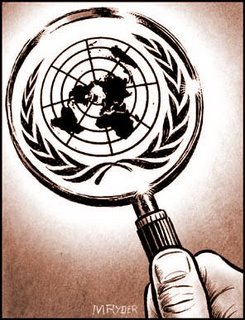 The United Nations helps governments use open source as a tool of repression, according to a group named the Inner City Press. Among their rambling and rumormongering, this group accuses the United Nations Development Programme (UNDP) of aiding the government of Uzbekistan in using open source as an instrument to support systematic repression.
The United Nations helps governments use open source as a tool of repression, according to a group named the Inner City Press. Among their rambling and rumormongering, this group accuses the United Nations Development Programme (UNDP) of aiding the government of Uzbekistan in using open source as an instrument to support systematic repression.I would offer a few general comments on this:
1. The UN has not shown much leadership in technology policymaking. UNDP itself has been incoherent and contradictory toward open source. While UNDP’s former chief, Mark Malloch Brown, urged Microsoft to work with the open source community, its IT Department organized marketing presentations to staff by big proprietary vendors. The gulf between the words of UNDP management and the actions of staff is often wide.
2. At least one group within the UN system (and ironically under UNDP) does an excellent job in promoting forward-thinking ICT policies: the Asia-Pacific Development Information Programme (APDIP). Unlike many UN agencies, it is focused, principled, competent and physically separate from UN headquarters.
3. Let’s be honest. UNDP’s mandate is to work in poor countries. And many poor countries have un-democratic governments. Partnerships with such governments are always difficult, often problematic and sometimes compromising.
Specifically, about UNDP’s project in Uzbekistan ...
UNDP’s technology efforts in Uzbekistan fall under a new project assisting the Uzbeki government in the formulation and implementation of ICT for development policy. According to UNDP, the project aims to promote an “[e]nabling environment for civil society to participate actively in the development process.” This is normal, meaningless UNDP fare.
The project—which runs from 2005-2009 with a budget of $535,000—included financing a report on free/open source software. It also supports typical UNDP project activities like study tours, seminars and other capacity-building efforts.
UNDP frequently works with governments of all persuasions to develop ICT policy frameworks. Nothing wrong with that. Technology is one aspect of a country’s development efforts. However, it is reasonable to ask whether UNDP should have certain policy parameters or conditions to avoid technologies of repression?
In other words, should UNDP attach strings to its ICT projects?
This is a serious question. Possible conditions might include making UNDP funding of ICT projects contingent upon partner governments not blocking access to news sites, or establishing privacy protections for users. And certainly UNDP should not provide or pay for software used enable censorship or limit user freedoms. It needs to openly and strongly condemn such practices.
Perhaps all UN agencies should consider setting common policies for ICT-in-development projects.
Three disclaimers:
o In the past I have worked for UNDP projects in various capacities.
o UNDP-APDIP participated in the Open ePolicy Group, which I founded.
o I know one person in UNDP’s office in Uzbekistan, though we have not discussed this post or these issues.
Categories: OpenSource, government, UnitedNations







2 comments:
The UN is definitely wishy washy about open source. Some insight I've gained is that some within the UN support it and some don't.
Should the UN be involved in policy of such things? Well, not from that angle. But if we look at it as 'allowing everyone to be able to access information' (WSIS was such a nifty acronym), there is a clear winner - as with open standards and open content.
It would be nice if the UN did encourage open source more. But I've never heard of anyone in the UN walking around and beating up people for using proprietary software.
Thanks, Taran.
UN insiders who wish to remain anonymmous have responded similarly that the UN has a massive case of schizophrenia when it comes to open source software.
Why should open source be any different so many other things the UN deals with?
Post a Comment